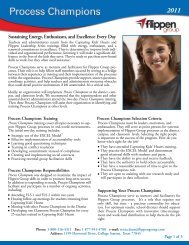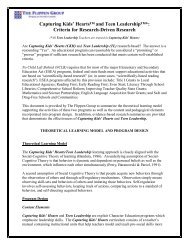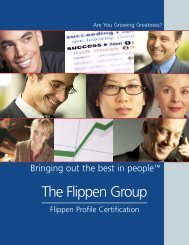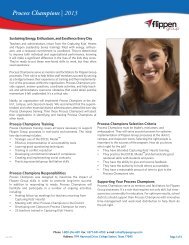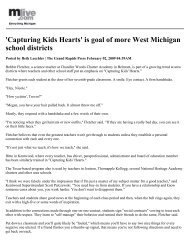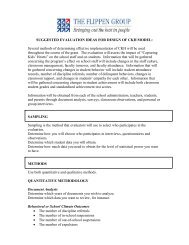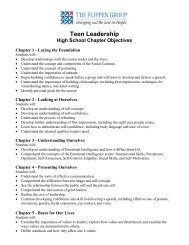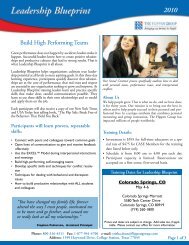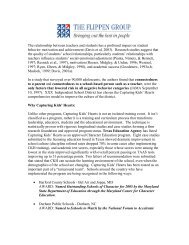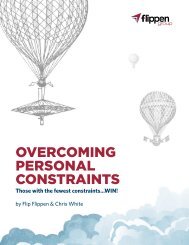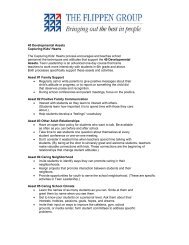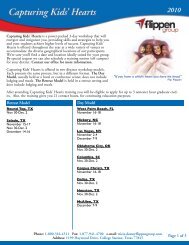Smart & Good High Schools - The Flippen Group
Smart & Good High Schools - The Flippen Group
Smart & Good High Schools - The Flippen Group
- No tags were found...
Create successful ePaper yourself
Turn your PDF publications into a flip-book with our unique Google optimized e-Paper software.
CHAPTER 5: Fostering the 8 Strengths of Character—Outcome 4ry, badly formed consciences have been the source ofmuch evil. Many things can contribute to poor conscienceformation, including ignorance, a low level of moral reasoning,misinformation, prejudicial attitudes, and badteaching and example. (Some terrorists, for example,have attended radical religious schools where they aretaught to hate certain groups and to see suicide bombingsas a noble martyrdom.)We can begin to help students form their consciences wellby helping them understand what a conscience is andhow it operates. See the box below for questions to pose.QUESTIONS ABOUT CONSCIENCE1. What is a conscience?2. Does everyone have one?3. How is a conscience formed? What role do otherpeople play in forming your conscience? Whatrole do you play?4. What is the difference between a “well-formed”conscience and a “badly formed” one? How canyou discern whether you have formed your consciencewell or poorly with regard to a particularmoral issue (e.g., cheating, sex, drugs, drinking)?5. Does conscience change over time? If so, why?What contributes to positive conscience development?To changes for the worse?6. Do people always follow their conscience? If not,why not? What happens to our conscience if werepeatedly ignore it?7. What if you don’t “have a conscience” aboutdoing a particular thing (suppose you don’t feelguilty about cheating, for example); does thatmean it’s right for you to do it? What else mightit mean?8. What does this proverb mean: “A clear conscienceis a soft pillow”?9. Why does the writer Catherine Cookson say, “Donot cut your conscience to fit the year’s fashions”?Some psychologists have written in depth about how consciencefunctions. In her book In <strong>Good</strong> Conscience: Reasonand Emotion in Moral Decision-Making, Sidney Callahanexamines the self-deceptive strategies that even basicallygood people often use to keep their consciences fromworking fully. Self-deception, she observes, is often “motivatedby the desire not to face demanding truths that aresuspected or already halfway known.” 31 We sense thatsomething is wrong in our life, but we turn away becausethe truth would be painful to face. She notes that psychotherapistsmust often “spend many hours slowly andgently getting persons to confront what their self-imposedblinders hide from themselves.” 32In All About You: A Course in Character for Teens, charactereducator Dorothy Kolomeisky devotes a chapter to howconscience is developed, its role in an ethical and happylife, and what happens when we ignore it. She includes astory from a young woman who recounts going againsther conscience at age 14 to join some friends in shoplifting.At first it was really difficult. I thought about being caughtand what my parents would say. I knew they would be completelydisappointed in me. But after a while it got easierand easier, until it became like a game. I was stealing allkinds of things, and I was good at it. 33This girl’s story illustrates desensitization—the diminishingof emotional response that happens with the repetitionof behavior or repeated exposure to a given stimulus.But it also illustrates how even when we numb our conscience,we may not succeed in killing it. Three yearslater, when this young woman applied for a job and wasasked if she had ever stolen anything, she found, to hersurprise, that her guilty conscience erupted and betrayedher past.Identify the FactorsThat Corrupt ConscienceIn <strong>The</strong> Seven C’s of Thinking Clearly 34 author George Rogersaddresses a question often neglected in discussions of ethicalthinking and conscience in particular: What keeps usfrom thinking clearly? What clouds or corrupts conscience?Rogers quotes Ben Franklin’s warning about the humantendency to rationalize: “So convenient a thing it is to bea reasonable creature, since it enables one to find ormake a reason for everything one has a mind to do.”Rogers goes on to identify seven “highly error-pronethinking habits that severely inhibit our ability to thinkrightly.” He personifies these error-prone habits of thinkingwith humorous names:1. Erroneous, who can make things appear to be otherthan what they really are.139<strong>Smart</strong> & <strong>Good</strong> <strong>High</strong> <strong>Schools</strong>



